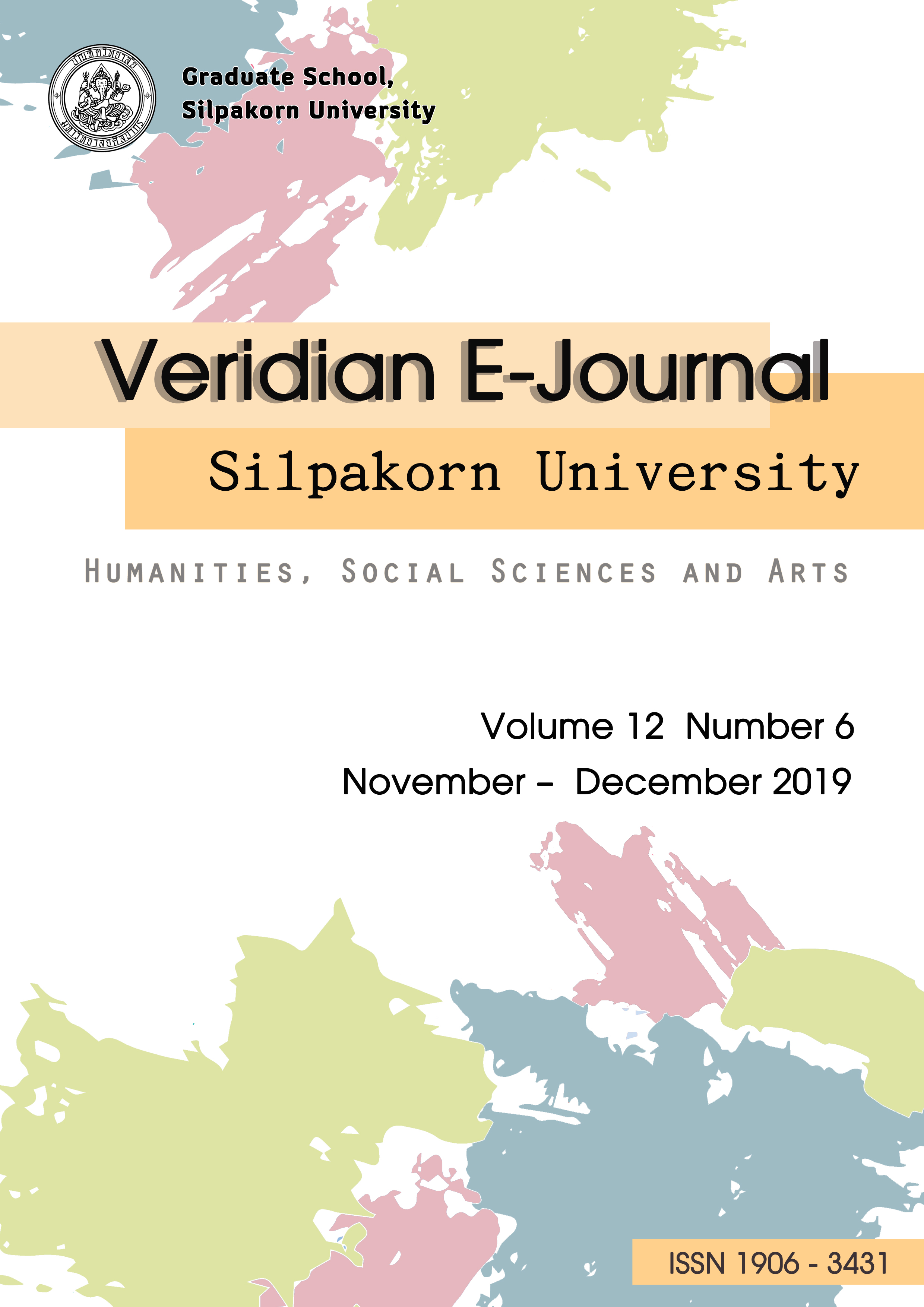การศึกษารูปประโยค だろうDaroo ในภาษาญี่ปุ่นกับสำนวนแปลในภาษาไทย กรณีศึกษาจากงานวรรณกรรม และบทสนทนาในละครโทรทัศน์ (A Study of “Daroo” in Japanese and Thai translation The Case Study of the Japanese Novels and Television Drama Scenario) Based on the Japanese Novels and Television Drama Scenario
Main Article Content
Abstract
งานวิจัยนี้มีวัตถุประสงค์เพื่อศึกษา 1) รูปประโยคแสดงความคาดคะเน หรือ だろうdaroo ในภาษาญี่ปุ่นว่าถูกแปลด้วยรูปทัศนภาวะสัญชานใดในภาษาไทย 2) ข้อแตกต่างในการใช้แต่ละรูปทัศนภาวะสัญชาน และ 3) หน้าที่ของ だろうdaroo โดยใช้วิธีปรากฏการวิทยา แนวการตีความ มีวิธีดำเนินการวิจัย ดังนี้ 1) กำหนดกลุ่มตัวอย่างที่เกี่ยวข้อง โดยเลือกวรรณกรรมและบทละครโทรทัศน์ญี่ปุ่นที่มีการแปลเป็นภาษาไทย ตั้งแต่ปี ค.ศ. 2009 2) รวบรวมรูปประโยค だろうdaroo 3) ศึกษาความต่างของทัศนภาวะสัญชานที่ถูกแปลออกมามากที่สุด 3 ลำดับ โดยวิเคราะห์จากการใช้ในบทบรรยายความคิดของตัวละครหรือ บทสนทนา แสดงการคาดคะเนภายใต้สถานการณ์ที่ใช้ และใช้ร่วมกับคำวิเศษณ์ใด
ผลการวิจัยพบว่า 1) だろうdaroo ถูกแปลด้วย “คง” “อาจ” และ “น่าจะ” มากที่สุด 2) だろうdaroo ที่แปลด้วย “คง” “น่าจะ” มักพบในบทบรรยายความคิดของตัวละคร ในกรณีที่ผู้พูดไม่ทราบถึงข้อเท็จจริง จึงคาดคะเนจากข้อมูลที่มี โดยใช้ต่างกันตามชนิดของข้อมูลที่นำมาคาดคะเน ส่วน だろうdaroo ที่แปลด้วย “อาจ” พบในบทสนทนาเท่านั้น ใช้ในกรณีที่ผู้พูดต้องการหลีกเลี่ยงการลงความเห็นชี้ชัดไม่มีการคาดคะเน และไม่สามารถใช้ร่วมกับคำวิเศษณ์ที่แสดงความมั่นใจได้ 3) หน้าที่ของ だろうdaroo ที่เห็นความแตกต่างเด่นชัด เมื่อเทียบกับภาษาไทย สรุปได้ว่า だろうdaroo ใช้ในการคาดคะเนเรื่องที่ผู้พูดไม่ทราบถึงข้อเท็จจริง และใช้ในการหลีกเลี่ยงการลงความเห็นในบทสนทนา
This research aims to: 1) study “Daroo” in Japanese and Thai Epistemic Modal Expression. That how they are translated to any form in Thai; 2) study the different in Thai Epistemic Modal Expression translated; and 3) how they can show the function of “Daroo”. The research method is divided into 3 phases: 1) define sample groups from Japanese Novels and Television Drama Scenario that translated in Thai and producted from 2009; 2) compile the “Daroo” sentence; and 3) study the different in Thai Epistemic Modal Expression that translated from “Daroo”, by 4 points: 1) used in character's thoughts or conversation; 2) used situation; 3) the speaker has an assumption or not; and 4) adverbs
The results showed that: 1) “Daroo” is translated by Thai Epistemic Modal Expression “khon”, “aat”, “naaca” as the top 3. 2) “Daroo”, translated by “khon” and “naaca”, will be used in character's thoughts more than conversation. They will be used in the case of the speakers may not know about the fact, so they used assumption or presumption. “Daroo”, translated by “aat”, will be used in conversation only in the event that the speakers want to avoid their opinion (Expressions for Avoiding Decisiveness). And 3) the study revealed that “Daroo” will be used in the character's thoughts, when the speakers may not know about the fact, so they used assumption or presumption. And in the conversation, “Daroo” can use in the event that speakers want to avoid their opinion (Expressions for Avoiding Decisiveness).

